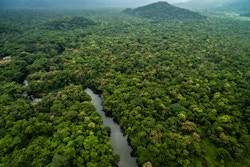
Indigenous Forest Economy:
Building a thriving Amazon economy for the future
The Amazon is being choked by an economy that is devouring its resources. But a fightback is brewing. Indigenous and local communities, with the support of Rainforest Foundation Norway, are taking matters into their own hands, showing that the rainforest can be both prosperous and protected.
SEEDS AND NUTS: Indigenous people harvesting seeds and nuts. Photo: Fernanda Ligabue/RFN
By Rainforest Foundation Norway.
From guardians to green entrepreneurs
Across six Amazon states, almost 800 Indigenous and forest communities run local sustainable economies in a rainforest area expanding nearly half a million square kilometers. Through the ForEco program, these communities organize to achieve sustainable income and local democracy by harvesting, growing, and producing food and forest products for markets, retailers, and schools. The biggest benefit lies in thriving communities where women are leading the way and young people choose to stay.
Also, it is an effective way of keeping the loggers at arm's length.
With so many different communities involved, the ways and traditions of harvesting, growing, and organizing are equally varied. In some places, Acai berries and Brazil nuts are collected from the forest and sold at local markets. Some communities produce and sell cassava and cocoa, while others promote their arts and crafts at urban outlets. Forest restoration and eco-tourism are also parts of building sustainable economies.

What is ForEco?
- Launched in 2021 with a budget of USD 18,2 million over five years, our ForEco program promotes and contributes to shifting the perspective on the Amazon, where the aim is to unlock its potential for long-term economic and social benefits, both within the region and beyond without depleting its resources.
- We work with local organizations to create a sustainable economic model for protected areas and Indigenous territories in the Brazilian Amazon.
- ForEco is a forest economy program for and by Indigenous peoples and local communities. Through the program, Rainforest Foundation Norway supports activities that create lasting positive change for the local Indigenous communities.
Funding opportunities
- Expanding the ForEco Program, promoting the economic potential of non-timber forest products (NTFPs) based on local produce and practices.
Funding partners:
- The Norwegian Embassy in Brazil




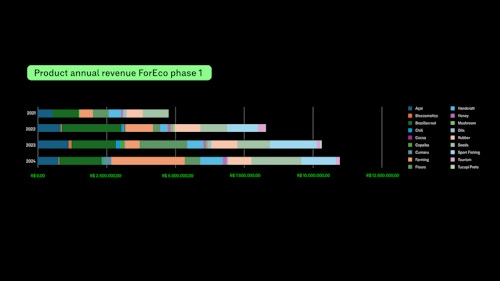
A people and planet-friendly blueprint
The ForEco program promotes the economic importance of local, sustainable food production, answering several Global Sustainability Goals to prevent poverty and hunger and develop healthy, sustainable livelihoods.
In the Rio Negro Indigenous territory and biological reserve, the Indigenous umbrella organization FOIRN works with 91 communities to provide healthy food to the local schools. The work includes training and education in nutrition, local food culture, and economic strategy and planning. In an area totaling some 17.6 million hectares, developing effective systems for transport and logistics is a key part of this.
"Indigenous food culture represents a deep connection between people and the land and is vital in preserving cultural heritage. Harvesting, cultivating, and preparing food is intertwined with traditions passed down through generations. Building strong forest economies thus contributes to preserving these cultural practices for future generations", says Geir Finstad, coordinating the ForEco Program at Rainforest Foundation Norway.
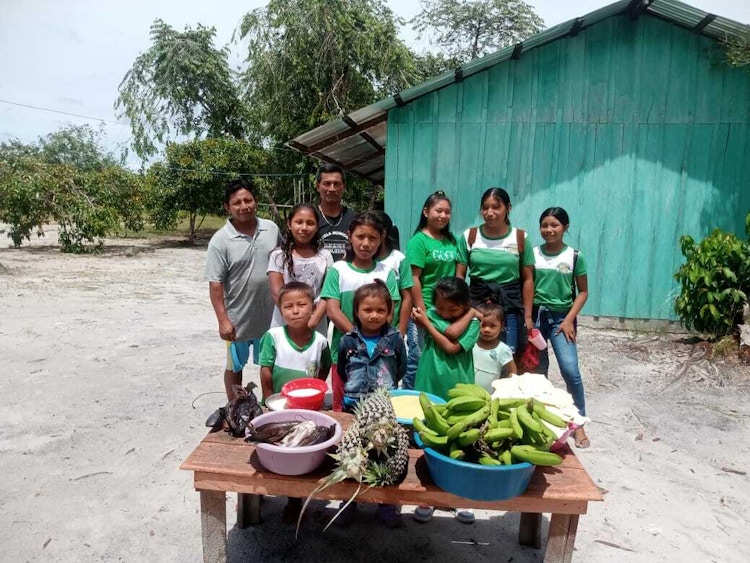
SCHOOL MEALS: The Indigenous umbrella organization FOIRN works with 91 communities to provide healthy food to local schools. Photo: FOIRN
Promoting traditional food culture is essential for achieving food sovereignty. A critical goal of the ForEco program is for Indigenous and forest communities to gain control over their food sources, ensuring they can meet their nutritional needs and maintain their cultural identity.
Traditional food practices also play a crucial role in promoting environmental sustainability.
"Indigenous and forest communities have developed sustainable harvesting and cultivation methods that protect biodiversity and maintain the health of ecosystems. By supporting these practices, we can ultimately contribute to a more resilient and sustainable food system for the larger society", says Finstad.

HARVESTING: Harvesting chili peppers in the rainforest. Photo: Fernanda Ligabue/RFN
Seeds of Change: Indigenous Youth and Women Lead Forest Sustainability
Creating vibrant local economies that focus on young people's important role is a way to ensure that they have a choice to stay in their communities rather than seek education and jobs elsewhere. In the project's next phase, ForEco will explore more opportunities to engage youth and young adults in innovation, using new technology, creativity, and traditional knowledge.
The rise in participation and opportunities for women and young people has been a much-welcome result of the Xingu Seeds Network (ARSX). This initiative is a network of more than 500 native seed collectors in the Xingu basin headwater, and it now has a flourishing youth group. These youths – from small towns, Indigenous, and other forest communities in Xingu - come together to collect seeds from the forest, restore ecosystems, and share experiences.

If they eat well, have a decent income, and live well where they are, they stay there. If they stay there, they protect the forest.
Antonio Adevaldo Dias da Costa , president of Memorial Chico Mendes.

REPLANTING: Harvesting seeds for replanting as part of the Xingu seed network program. Photo: Rogerio Assis/ISA
By clearly emphasizing youth, the ForEco program will accommodate their often complementary skill set and approaches to participate in the local production systems. This involves investing in innovation, uniting traditional knowledge and techniques with new sustainable strategies, and driving product development, production, and commercialization solutions.
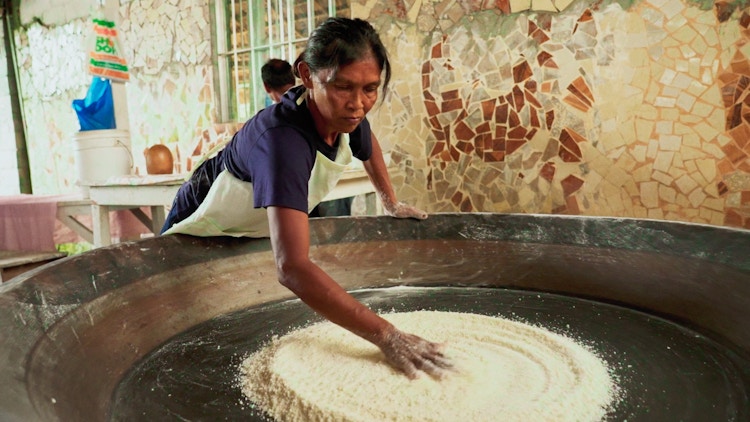
PRODUCTS: Processing manioc harvested from the forest into flour. Photo: Fernanda Ligabue/RFN
Advocating for policy change
To gain recognition of the Amazon as a source of diverse and valuable resources, an essential element of the ForEco program is advocating for policy changes that incentivize local, sustainable production. The main argument is that these green alternatives must compete more with the current dominant environmentally destructive practices.
ForEco presents an alternative revenue model for communities in contrast to the short-termism and harmful actions of agro-industrial and other forms of monoculture cultivation in the Amazon. Lobbying for subsidies and tax breaks, increased public awareness, and better market access are central to the ForEco program.
A deforestation-free market
ForEco focuses on promoting the economic potential of non-timber forest products (NTFPs). With this initiative, we seek to shift the economic focus away from unsustainable practices like monoculture agriculture, particularly soy and cattle farming, which are responsible for roughly 70% of Amazonian deforestation. The long-term aim is for the market demand for sustainable products to drive change within the Brazilian agricultural sector, building a national green economy for the future. Through the ForEco program, we promote the economic, ecological, climatic, and social advantages of a "deforestation-free market" to international investors and buyers of Brazilian products.

What are Non-timber forest products?
- Edible products, such as Açai, Manioc, fruit, nuts, spices and honey
- Medicinal and Bio-cosmetics products, such as seed oils, herbs, barks or roots
- Fiber and materials, such as or natural rubber (latex), and plant fibers
- Animal products such as insects or fish, including byproducts such as feathers, beeswax and silk
- Seeds, nuts and seedlings for reforestation
NTFPs play a crucial role in the livelihoods of many communities, particularly in rural and Indigenous populations. They offer economic, cultural, and ecological benefits, often being a sustainable source of income while helping to conserve forest biodiversity.

"Political advocacy is essential to strengthening socio-biodiversity economies and their peoples. By strengthening these advocacy actions, The ForEco Program contributes directly to the dialogue between communities, civil society organizations, and policymakers, ensuring that local needs are represented, heard, and respected."
Laura Souza, Advocacy Adviser, ÓSocioBio.
Observatório das Economies of Sociobiodiversity (ÓSocioBio) is an essential partner for the policy aspect of the ForEco program. ÓSocioBio is a collective of civil society organizations and social groups that provide a prominent platform for the advocacy of parliamentary reforms and sustainable business practices.
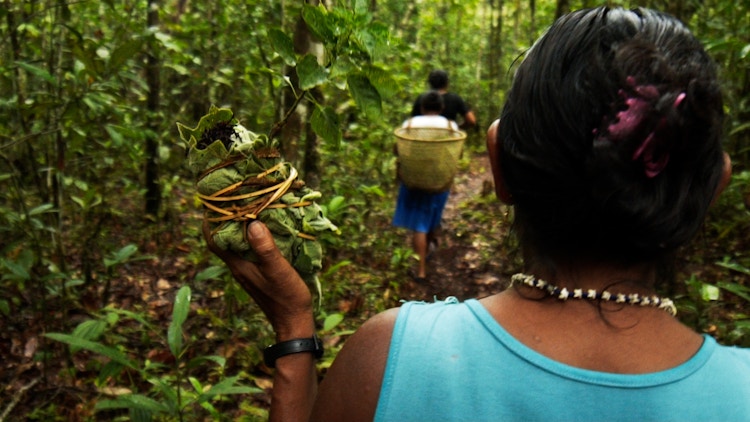
RAW MATERIALS: Indigenous people harvesting raw materials for non-timber forest products. Photo: Fernanda Ligabue/RFN
Since 2021, the ForEco program has already seen considerable success.
- 799 communities are involved in and benefit from the program, involving nearly 10,000 people. Almost 50% are women.
- Almost 5000 persons have gone through income generation training and education.
- By 2023, the program supported 76 value chains, each generating income for communities.
- 28 feasibility studies and 27 pilots have been developed in Indigenous territories, providing unique insight and a platform for research, promotion, and development.
- 56 separate contracts have been agreed between extractivist producers and buyers/clients

AÇAÍ: Processing harvested açaí berries. Photo: Fernanda Ligabue/RFN
A Forest with a Future
Rainforest Foundation Norway is ready to build on these first important results and positive developments. Bolstered by the current political ambition in Brazil to create opportunities for sustainable agriculture, reduce poverty, and change food systems, there is good momentum to expand the ForEco program. We recognize and welcome international convergence between the nature, food, and climate agendas. This shift is significant.
Through new partnerships, a broader geographical remit, and closer bonds with governmental and non-governmental bodies, the strategic initiatives of the ForEco program – and the enduring support of donors and investors – are set to build an optimistically-minded forest economy for the future.

"These are holistic production systems based on social and biological diversity, traditional knowledge, and innovation. Ultimately, the ForEco program contributes to preserving the forest, culture, and way of life of the indigenous and other forest-dwelling peoples living in the Amazon".
Geir Finstad, Senior Grant Manager, Brazil Program, Rainforest Foundation Norway
For more information about the ForEco program, contact:

Geir Finstad
Senior Grant Manager, Brazil Programme
geirf@rainforest.no




